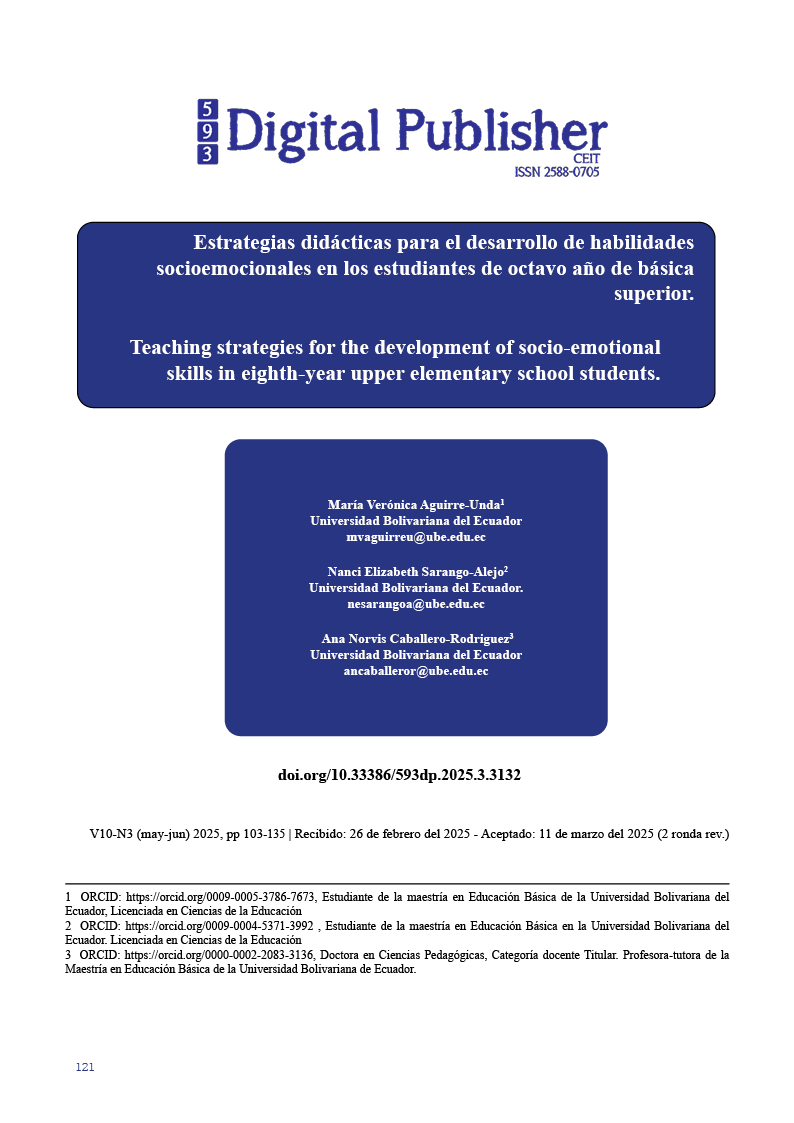Teaching strategies for the development of socio-emotional skills in eighth-year upper elementary school students
Main Article Content
Abstract
This study highlights the importance of emotional education in the school environment, especially in disadvantaged contexts where students face multiple socioeconomic and educational challenges. Despite theoretical advances in emotional intelligence, there is a considerable gap in its practical application within the educational system. The research focuses on the need to develop intervention programs that promote socioemotional well-being in eighth grade students, in order to strengthen essential skills such as empathy, resilience, self-esteem and respect. As part of the teaching strategy, dance is proposed as an effective tool for socioemotional development, since it allows the exploration of emotions, the strengthening of self-esteem and the construction of healthy relationships between students. However, it is recognized that the implementation of these programs in rural and resource-limited environments presents significant challenges, such as the lack of adequate infrastructure and restricted access to materials and professionals specialized in emotional education. The findings of the study confirm that the promotion of socioemotional skills is a key factor in improving learning and school coexistence. Incorporating collaborative strategies and conflict resolution techniques into the curriculum not only fosters an active learning environment, but also contributes to the comprehensive development of students.
Downloads
Article Details

This work is licensed under a Creative Commons Attribution-NonCommercial-ShareAlike 4.0 International License.
1. Derechos de autor
Las obras que se publican en 593 Digital Publisher CEIT están sujetas a los siguientes términos:
1.1. 593 Digital Publisher CEIT, conserva los derechos patrimoniales (copyright) de las obras publicadas, favorece y permite la reutilización de las mismas bajo la licencia Licencia Creative Commons 4.0 de Reconocimiento-NoComercial-CompartirIgual 4.0, por lo cual se pueden copiar, usar, difundir, transmitir y exponer públicamente, siempre que:
1.1.a. Se cite la autoría y fuente original de su publicación (revista, editorial, URL).
1.1.b. No se usen para fines comerciales u onerosos.
1.1.c. Se mencione la existencia y especificaciones de esta licencia de uso.
References
Ander-Egg, E., & Aguilar, M. J. (1995). Técnicas de investigación social (Vol. 24). Buenos Aires: Lumen.
Bautista, N. P. (2022). Proceso de la investigación cualitativa: epistemología, metodología y aplicaciones. Editorial: El Manual Moderno.
Bryman, A. (2016). Social research methods. Oxford university press.
Codina, N., Pestana, J. V., Castillo, I., & Balaguer, I. (2016). “Ellas a estudiar y bailar, ellos a hacer deporte”: Un estudio de las actividades extraescolares de los adolescentes mediante los presupuestos de tiempo. Cuadernos de psicología del deporte, 16(1), 233-242.
Corzo Orozco, Y. A. (2020). Fortalecimiento de las habilidades sociales en los niños de transición a través de una propuesta pedagógica en una institución pública de la ciudad de Bucaramanga.
Glenn, D. E. A. (2022). Social emotional learning: Teachers’ perceptions and understandings regarding the five social emotional learning competencies (Doctoral dissertation, College of Saint Elizabeth).
Durlak, J., Weissberg, R., & Casel. (2007). The impact of after-school programs that promote personal and social skills. Recuperado el 20 de mayo de 2007, de http://www.casel.org (publicado originalmente en 2005).
Durlak, J. A., Weissberg, R. P., Dymnicki, A. B., Taylor, R. D., & Schellinger, K. B. (2011). The impact of enhancing students’ social and emotional learning: A meta-analysis of school-based universal interventions. Child Development, 82(1), 405-432. https://doi.org/10.1111/j.1467-8624.2010.01564.x
Fraga Rodríguez, R., y Herrera Padrón, C. (1999). Metodología de la investigación educativa. Ciudad de La Habana. (Libro digital)
Goleman, D. (1995). Emotional intelligence: Why it can matter more than IQ. Bantam Books.
Jiménez, L. (2020). Impacto de la investigación cuantitativa en la actualidad. Convergence Tech, 4(IV), 59-68.
Marroquín-Soto, C., Padilla-Avalos, C. A., & Sampieri, R. H. (2023). Fundamentos metodológicos para investigación clínica en estomatología. Revista Estomatológica Herediana, 33(1), 56-61.
Payton, J. W., Wardlaw, D. M., Graczyk, P. A., Bloodworth, M. R., Tompsett, C. J., & Weissberg, R. P. (2000). Social and emotional learning: A framework for promoting mental health and reducing risk behavior in children and youth. Journal of school health, 70(5), 179-185.
Reynosa Navarro, E., Serrano Polo, E. A., Ortega-Parra, A. J., Navarro Silva, O., Cruz-Montero, J. M., & Salazar Montoya, E. O. (2020). Estrategias didácticas para investigación científica: relevancia en la formación de investigadores. Revista Universidad y Sociedad, 12(1), 259-266.
Sampieri, R. H., Valencia, S. M., & Soto, R. C. (2014). Construcción de un instrumento para medir el clima organizacional en función del modelo de los valores en competencia. Contaduría y administración, 59(1), 229-257.
Torres Sillagana, E. V. (2021). Habilidades sociales y la comunicación interpersonal en los estudiantes de Básica Superior de la Unidad Educativa “José Joaquín Olmedo” del cantón Ambato durante el covid-19 (Bachelor’s thesis, Carrera de Psicopedagogía).
Vallejo Cobo, M. E. (2023). Gamificación y el desarrollo de competencias socioemocionales en estudiantes de Educación General Básica Superior en la Unidad Educativa Bautista (Bachelor’s thesis, Carrera de Psicopedagogía).




